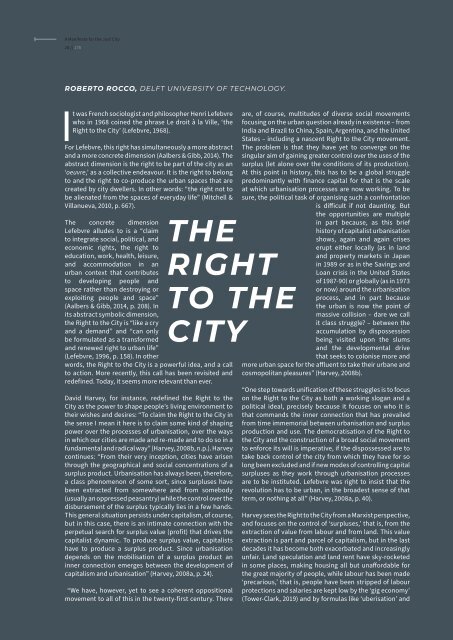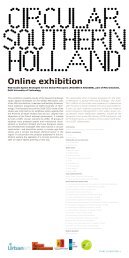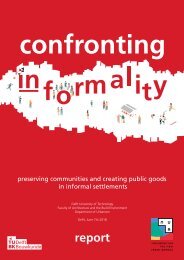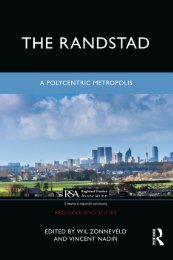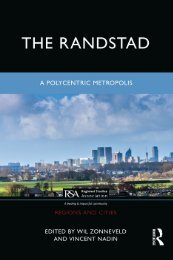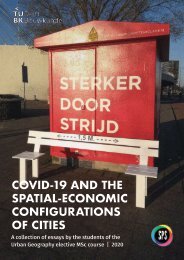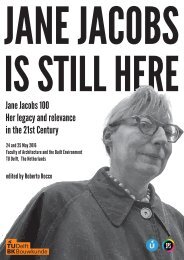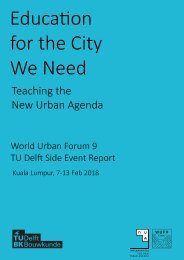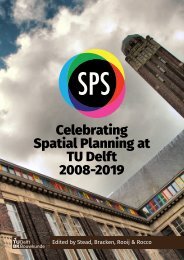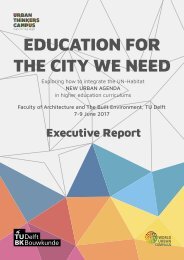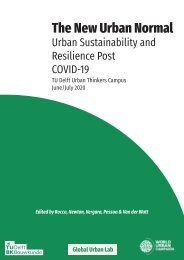A Manifesto for the Just City
On Monday 29 MARCH at 18:00 (CET/Amsterdam), TU Delft launched the Book "A Manifesto for the Just City", with texts by a number of guests and 43 manifestos written by students from 25 universities from all over the world. A “Manifesto for the Just City” comes in the wake of the realisation that socio-spatial justice is a crucial dimension for sustainability transitions. Growing inequality and the erosion of the public sphere undermine the social and political structures required to fight climate change, pandemics and other systemic shocks. With this book, we have sought to encourage students to formulate their own visions for the Just City and for a just transition. This book is result of an Urban Thinkers Campus organised between 9 and 30 November 2020. The Urban Thinkers Campus (UTC) model is an initiative of UN-Habitat’s World Urban Campaign, conceived in 2014 as an open space for critical exchange between stakeholders and partners. It aims to promote debate and action on sustainable and inclusive urbanization upholding the principles and guidelines contained in the New Urban Agenda, launched at Habitat-III in 2016 in Quito, Ecuador.
On Monday 29 MARCH at 18:00 (CET/Amsterdam), TU Delft launched the Book "A Manifesto for the Just City", with texts by a number of guests and 43 manifestos written by students from 25 universities from all over the world.
A “Manifesto for the Just City” comes in the wake of the realisation that socio-spatial justice is a crucial dimension for sustainability transitions. Growing inequality and the erosion of the public sphere undermine the social and political structures required to fight climate change, pandemics and other systemic shocks. With this book, we have sought to encourage students to formulate their own visions for the Just City and for a just transition.
This book is result of an Urban Thinkers Campus organised between 9 and 30 November 2020. The Urban Thinkers Campus (UTC) model is an initiative of UN-Habitat’s World Urban Campaign, conceived in 2014 as an open space for critical exchange between stakeholders and partners. It aims to promote debate and action on sustainable and inclusive urbanization upholding the principles and guidelines contained in the New Urban Agenda, launched at Habitat-III in 2016 in Quito, Ecuador.
You also want an ePaper? Increase the reach of your titles
YUMPU automatically turns print PDFs into web optimized ePapers that Google loves.
A <strong>Manifesto</strong> <strong>for</strong> <strong>the</strong> <strong>Just</strong> <strong>City</strong><br />
28 // 276<br />
ROBERTO ROCCO, DELFT UNIVERSITY OF TECHNOLOGY.<br />
It was French sociologist and philosopher Henri Lefebvre<br />
who in 1968 coined <strong>the</strong> phrase Le droit à la Ville, ‘<strong>the</strong><br />
Right to <strong>the</strong> <strong>City</strong>’ (Lefebvre, 1968).<br />
For Lefebvre, this right has simultaneously a more abstract<br />
and a more concrete dimension (Aalbers & Gibb, 2014). The<br />
abstract dimension is <strong>the</strong> right to be part of <strong>the</strong> city as an<br />
‘oeuvre,’ as a collective endeavour. It is <strong>the</strong> right to belong<br />
to and <strong>the</strong> right to co-produce <strong>the</strong> urban spaces that are<br />
created by city dwellers. In o<strong>the</strong>r words: “<strong>the</strong> right not to<br />
be alienated from <strong>the</strong> spaces of everyday life” (Mitchell &<br />
Villanueva, 2010, p. 667).<br />
THE<br />
RIGHT<br />
TO THE<br />
CITY<br />
The concrete dimension<br />
Lefebvre alludes to is a “claim<br />
to integrate social, political, and<br />
economic rights, <strong>the</strong> right to<br />
education, work, health, leisure,<br />
and accommodation in an<br />
urban context that contributes<br />
to developing people and<br />
space ra<strong>the</strong>r than destroying or<br />
exploiting people and space”<br />
(Aalbers & Gibb, 2014, p. 208). In<br />
its abstract symbolic dimension,<br />
<strong>the</strong> Right to <strong>the</strong> <strong>City</strong> is “like a cry<br />
and a demand” and “can only<br />
be <strong>for</strong>mulated as a trans<strong>for</strong>med<br />
and renewed right to urban life”<br />
(Lefebvre, 1996, p. 158). In o<strong>the</strong>r<br />
words, <strong>the</strong> Right to <strong>the</strong> <strong>City</strong> is a powerful idea, and a call<br />
to action. More recently, this call has been revisited and<br />
redefined. Today, it seems more relevant than ever.<br />
David Harvey, <strong>for</strong> instance, redefined <strong>the</strong> Right to <strong>the</strong><br />
<strong>City</strong> as <strong>the</strong> power to shape people’s living environment to<br />
<strong>the</strong>ir wishes and desires: “To claim <strong>the</strong> Right to <strong>the</strong> <strong>City</strong> in<br />
<strong>the</strong> sense I mean it here is to claim some kind of shaping<br />
power over <strong>the</strong> processes of urbanisation, over <strong>the</strong> ways<br />
in which our cities are made and re-made and to do so in a<br />
fundamental and radical way” (Harvey, 2008b, n.p.). Harvey<br />
continues: “From <strong>the</strong>ir very inception, cities have arisen<br />
through <strong>the</strong> geographical and social concentrations of a<br />
surplus product. Urbanisation has always been, <strong>the</strong>re<strong>for</strong>e,<br />
a class phenomenon of some sort, since surpluses have<br />
been extracted from somewhere and from somebody<br />
(usually an oppressed peasantry) while <strong>the</strong> control over <strong>the</strong><br />
disbursement of <strong>the</strong> surplus typically lies in a few hands.<br />
This general situation persists under capitalism, of course,<br />
but in this case, <strong>the</strong>re is an intimate connection with <strong>the</strong><br />
perpetual search <strong>for</strong> surplus value (profit) that drives <strong>the</strong><br />
capitalist dynamic. To produce surplus value, capitalists<br />
have to produce a surplus product. Since urbanisation<br />
depends on <strong>the</strong> mobilisation of a surplus product an<br />
inner connection emerges between <strong>the</strong> development of<br />
capitalism and urbanisation” (Harvey, 2008a, p. 24).<br />
“We have, however, yet to see a coherent oppositional<br />
movement to all of this in <strong>the</strong> twenty-first century. There<br />
are, of course, multitudes of diverse social movements<br />
focusing on <strong>the</strong> urban question already in existence – from<br />
India and Brazil to China, Spain, Argentina, and <strong>the</strong> United<br />
States – including a nascent Right to <strong>the</strong> <strong>City</strong> movement.<br />
The problem is that <strong>the</strong>y have yet to converge on <strong>the</strong><br />
singular aim of gaining greater control over <strong>the</strong> uses of <strong>the</strong><br />
surplus (let alone over <strong>the</strong> conditions of its production).<br />
At this point in history, this has to be a global struggle<br />
predominantly with finance capital <strong>for</strong> that is <strong>the</strong> scale<br />
at which urbanisation processes are now working. To be<br />
sure, <strong>the</strong> political task of organising such a confrontation<br />
is difficult if not daunting. But<br />
<strong>the</strong> opportunities are multiple<br />
in part because, as this brief<br />
history of capitalist urbanisation<br />
shows, again and again crises<br />
erupt ei<strong>the</strong>r locally (as in land<br />
and property markets in Japan<br />
in 1989 or as in <strong>the</strong> Savings and<br />
Loan crisis in <strong>the</strong> United States<br />
of 1987-90) or globally (as in 1973<br />
or now) around <strong>the</strong> urbanisation<br />
process, and in part because<br />
<strong>the</strong> urban is now <strong>the</strong> point of<br />
massive collision – dare we call<br />
it class struggle? – between <strong>the</strong><br />
accumulation by dispossession<br />
being visited upon <strong>the</strong> slums<br />
and <strong>the</strong> developmental drive<br />
that seeks to colonise more and<br />
more urban space <strong>for</strong> <strong>the</strong> affluent to take <strong>the</strong>ir urbane and<br />
cosmopolitan pleasures” (Harvey, 2008b).<br />
“One step towards unification of <strong>the</strong>se struggles is to focus<br />
on <strong>the</strong> Right to <strong>the</strong> <strong>City</strong> as both a working slogan and a<br />
political ideal, precisely because it focuses on who it is<br />
that commands <strong>the</strong> inner connection that has prevailed<br />
from time immemorial between urbanisation and surplus<br />
production and use. The democratisation of <strong>the</strong> Right to<br />
<strong>the</strong> <strong>City</strong> and <strong>the</strong> construction of a broad social movement<br />
to en<strong>for</strong>ce its will is imperative, if <strong>the</strong> dispossessed are to<br />
take back control of <strong>the</strong> city from which <strong>the</strong>y have <strong>for</strong> so<br />
long been excluded and if new modes of controlling capital<br />
surpluses as <strong>the</strong>y work through urbanisation processes<br />
are to be instituted. Lefebvre was right to insist that <strong>the</strong><br />
revolution has to be urban, in <strong>the</strong> broadest sense of that<br />
term, or nothing at all” (Harvey, 2008a, p. 40).<br />
Harvey sees <strong>the</strong> Right to <strong>the</strong> <strong>City</strong> from a Marxist perspective,<br />
and focuses on <strong>the</strong> control of ‘surpluses,’ that is, from <strong>the</strong><br />
extraction of value from labour and from land. This value<br />
extraction is part and parcel of capitalism, but in <strong>the</strong> last<br />
decades it has become both exacerbated and increasingly<br />
unfair. Land speculation and land rent have sky-rocketed<br />
in some places, making housing all but unaf<strong>for</strong>dable <strong>for</strong><br />
<strong>the</strong> great majority of people, while labour has been made<br />
‘precarious,’ that is, people have been stripped of labour<br />
protections and salaries are kept low by <strong>the</strong> ‘gig economy’<br />
(Tower-Clark, 2019) and by <strong>for</strong>mulas like ‘uberisation’ and


